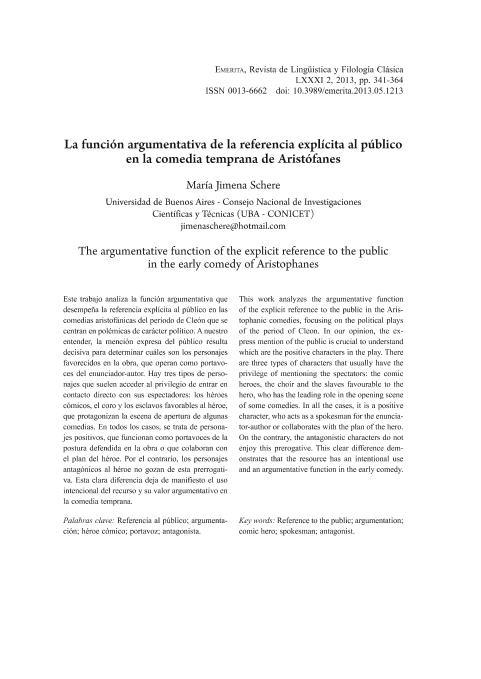Mostrar el registro sencillo del ítem
dc.contributor.author
Schere, María Jimena

dc.date.available
2017-11-14T22:11:04Z
dc.date.issued
2013-10
dc.identifier.citation
Schere, María Jimena; La función argumentativa de la referencia explícita al público en la comedia temprana de Aristófanes; Consejo Superior de Investigaciones Científicas. Instituto de Filología; Emerita; 81; 2; 10-2013; 341-364
dc.identifier.issn
0013-6662
dc.identifier.uri
http://hdl.handle.net/11336/28187
dc.description.abstract
Este trabajo analiza la función argumentativa que desempeña la referencia explícita al público en las comedias aristofánicas del período de Cleón que se centran en polémicas de carácter político. A nuestro entender, la mención expresa del público resulta decisiva para determinar cuáles son los personajes favorecidos en la obra, que operan como portavoces del enunciador-autor. Hay tres tipos de personajes que suelen acceder al privilegio de entrar en contacto directo con sus espectadores: los héroes cómicos, el coro y los esclavos favorables al héroe, que protagonizan la escena de apertura de algunas comedias. En todos los casos, se trata de personajes positivos, que funcionan como portavoces de la postura defendida en la obra o que colaboran con el plan del héroe. Por el contrario, los personajes antagónicos al héroe no gozan de esta prerrogativa. Esta clara diferencia deja de manifiesto el uso intencional del recurso y su valor argumentativo en la comedia temprana.
dc.description.abstract
This work analyzes the argumentative function of the explicit reference to the public in the Aristophanic comedies, focusing on the political plays of the period of Cleon. In our opinion, the express mention of the public is crucial to understand which are the positive characters in the play. There are three types of characters that usually have the privilege of mentioning the spectators: the comic heroes, the choir and the slaves favourable to the hero, who has the leading role in the opening scene of some comedies. In all the cases, it is a positive character, who acts as a spokesman for the enunciator-author or collaborates with the plan of the hero. On the contrary, the antagonistic characters do not enjoy this prerogative. This clear difference demonstrates that the resource has an intentional use and an argumentative function in the early comedy.
dc.format
application/pdf
dc.language.iso
spa
dc.publisher
Consejo Superior de Investigaciones Científicas. Instituto de Filología
dc.rights
info:eu-repo/semantics/openAccess
dc.rights.uri
https://creativecommons.org/licenses/by-nc-sa/2.5/ar/
dc.subject
Mención del Público
dc.subject
Estrategia Argumentativa
dc.subject
Héroe Cómico
dc.subject
Antagonista
dc.subject.classification
Estudios Generales del Lenguaje

dc.subject.classification
Lengua y Literatura

dc.subject.classification
HUMANIDADES

dc.title
La función argumentativa de la referencia explícita al público en la comedia temprana de Aristófanes
dc.title
The argumentative function of the explicit reference to the public in the early comedy of Aristophanes
dc.type
info:eu-repo/semantics/article
dc.type
info:ar-repo/semantics/artículo
dc.type
info:eu-repo/semantics/publishedVersion
dc.date.updated
2017-11-13T19:57:49Z
dc.journal.volume
81
dc.journal.number
2
dc.journal.pagination
341-364
dc.journal.pais
España

dc.journal.ciudad
Madrid
dc.description.fil
Fil: Schere, María Jimena. Consejo Nacional de Investigaciones Científicas y Técnicas; Argentina. Universidad de Buenos Aires; Argentina
dc.journal.title
Emerita
dc.relation.alternativeid
info:eu-repo/semantics/altIdentifier/url/http://emerita.revistas.csic.es/index.php/emerita/article/view/1053
dc.relation.alternativeid
info:eu-repo/semantics/altIdentifier/doi/http://dx.doi.org/10.3989/emerita.2013.05.1213
Archivos asociados
